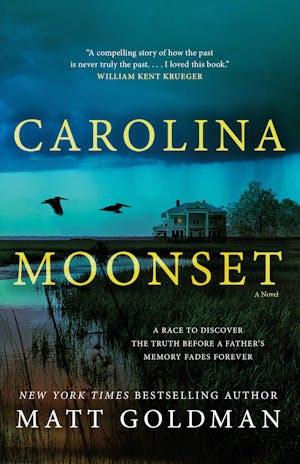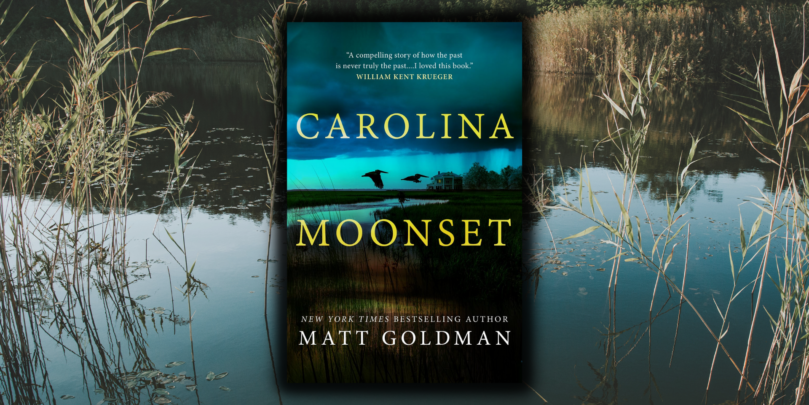 Both suspenseful and deeply moving, Carolina Moonset is an engrossing novel about family, memories both golden and terrible, and secrets too dangerous to stay hidden forever, from New York Times bestselling and Emmy Award-winning author, Matt Goldman.
Both suspenseful and deeply moving, Carolina Moonset is an engrossing novel about family, memories both golden and terrible, and secrets too dangerous to stay hidden forever, from New York Times bestselling and Emmy Award-winning author, Matt Goldman.
Joey Green has returned to Beaufort, South Carolina, with its palmettos and shrimp boats, to look after his ailing father, who is succumbing to dementia, while his overstressed mother takes a break. Marshall Green’s short-term memory has all but evaporated, but, as if in compensation, his oldest memories are more vivid than ever. His mind keeps slipping backwards in time, retreating into long-ago yesterdays of growing up in Beaufort as a boy.
At first this seems like a blessing of sorts, with the past providing a refuge from a shrinking future, but Joey grows increasingly anxious as his father’s hallucinatory arguments with figures from his youth begin to hint at deadly secrets, scandals, and suspicions long buried and forgotten. Resurfacing from decades past are mysteries that still have the power to shatter lives—and change everything Joey thought he knew.
Especially when a new murder brings the police to his door…
Carolina Moonset will be available on May 31st, 2022. Please enjoy the following excerpt!
CHAPTER ONE
When I saw my first palm tree, I almost died of disappointment. It wasn’t on a tiny island. It didn’t have coconuts under its fronds or monkeys clinging to its trunk. That palm tree failed me.
The tree lived in Beaufort, South Carolina, in my grandparents’ backyard, and the letdown I felt over its lack of picture-book clichés is my earliest memory of that place. I must have been three or four. It was the same trip I met the ocean at Hunting Island State Park. I waded into the salt water. Tasted it on my fingers. Scanned the surface for sharks. Thought every dolphin and hunk of driftwood was a shark, which sent me screaming and splashing back to the beach.
I spent languid afternoons with my sisters catching chameleons. We put the lizards in a box and named them. Took the box inside to show the adults. And under strict and often shrieked orders, carried the box back outside to let the creatures go. The chameleons turned brown on the palm tree’s trunk or green if set on a leaf. I was determined to bring one home to Chicago and set it in our snowy backyard to see if it would turn white. But my sisters told my parents of my plan, and the chameleon was freed from my suitcase.
That’s when I learned I could not trust family.
“Remember that time, Joey, when we came down to Beaufort to visit Grandpa and Grandma?” My father spoke in a South Carolina drawl, a melody he’d reclaimed since moving back to the place he grew up. He’d always been loquacious, but his lyrical cadence had lain dormant for half a century until the salt air brought it back to life. “You couldn’t have been more than three years old. Grandma took you kids to the strawberry farm, and you went row to row picking strawberries and putting them in your little basket. Then Grandma picked a berry and added it to your basket. . . .” My father began to laugh, the memory vivid to him like film. “. . . And you said, ‘No! Joey’s basket!’ And you dumped all your strawberries in the dirt. . . .” My father laughed so hard he listed, held up by his shoulder strap in the back seat.
I didn’t remember the strawberry farm. The incident happened over forty years ago. Forty vacations ago. Although trips to visit family don’t qualify as vacations. Families have pecking orders, and each gathering is an opportunity to shift the hierarchy—that hardly creates an atmosphere for relaxation.
My mother sat in the passenger seat. She responded to my father’s story with a tragic smile. Carol Green had aged in the last six months. Aged fifteen years by the looks of it, her face now drawn and pale. Her gray hair dull. She’d had it cut short. Not cute short but surrender short. She could no longer deal with something as trivial as hair. She’d lost weight. It looked like her bones wanted to push their way out of her skin. From her cheeks, her shoulders, her wrists, and her knees.
She was only seventy-three.
My mother used to sparkle. She’d had the social calendar of a debutante. A champion pickleball player, she and Judy Campbell ran the table at the tournament out on Fripp Island. But age had caught up to her. Passed her even. My sisters had each visited to give her a break. Now it was my turn. My parents had picked me up at the Charleston airport. Such expectation and excitement on the faces of Carol and Marshall Green. It’s a thing with relocated retirees. They’re eager to show you their life of leisure the way children are eager to show you the fort they built.
“What color is your suitcase?” My father stood at the carousel excited for the responsibility of spotting and retrieving the bag. The challenge of lifting it. He was surrounded by septuagenarians like himself, most picking up their children and grandchildren who’d flown down to visit for spring break, the beginning of Beaufort’s bustling tourist season.
“Navy,” I said. “It’s a roller with a green bandana tied to the handle.”
“Green bandana for Joey Green. Smart.” He smiled, entertained by his observation. Brown eyes squinting behind trifocals, the old kind with visible lines, his eyebrows creeping over in need of a trim.
My mother pulled me aside and lowered her voice. “I want you to drive back to Beaufort, Joey. Your father’s sense of direction is . . .” She shook her head and pressed her lips together. “And he doesn’t like it when I drive. He complained the whole way here.” My mother sighed. “We were at the neurologist this morning. She changed the diagnosis. I haven’t even had a chance to tell your sisters yet.”
My father turned around and said, “Hey, Joey. What color is your suitcase?”
“It’s navy, Dad. A roller bag with a green bandana tied to the handle.”
“Green bandana for Joseph Green. Good thinking.” He gave me a thumbs-up, turned around, then walked toward where the conveyer belt spit the bags onto the metal merry-go-round. He moved with small, slow steps, like a cartoon old person. Shoulders stooped. Suspenders holding his jeans on his slender hips. Bent forward as if he needed the tilt to maintain inertia.
He was only seventy-five.
I wondered when my father had started wearing suspenders and if I was too old to be embarrassed about it. And I wondered when I’d started associating the word only with seventy-five. Maybe it’s because my father’s parents had lived into their nineties. I looked at my mother and said, “Dad has Parkinson’s and Alzheimer’s, right?”
My mother shook her head. “That’s what they thought, but the neurologist and internist discussed Dad’s symptoms. Now they think he has Lewy Body Dementia.”
“What’s that?”
My father got halfway to the end of the carousel then stopped and turned to show us a most confused expression. “Carol?”
“What, Marshall?”
“What are we waiting for?”
“Joey’s bag.”
“I’ll get it. What does it look like?”
I told him. Again. As if it were for the first time. As if my father were a small child. I had last seen him at Thanksgiving in Chicago—that’s when I first witnessed his disease while driving to a restaurant in Evanston. He had said it looked like rain and we should go back to get umbrellas. I told him I’d brought umbrellas. Then five minutes later, he said it looked like rain and we should go back to get umbrellas. I said, “Dad. You just said that. I have umbrellas.” He apologized. Said he was getting old. Said something about how it was going to happen to me, too, one day. We laughed it off. Then a few minutes later, he said it looked like rain and we should go back to get umbrellas. I caught my mother’s eyes in the rearview mirror. She was crying.
At the Charleston airport, my mother said, “We’ll talk more about it when we get home. And there is a silver lining. Dad’s long-term memory isn’t affected. He won’t forget me. Or you. Or your sisters or his grandchildren. He’s been talking nonstop about growing up here. And about when you and the girls were little. Your father has loved the simple pleasures in life, and to hear his stories about the old days, it’s really quite sweet.”
My mother’s words were hopeful but her eyes betrayed her. She was moving forward in time as my father moved backward. She was losing her companion of fifty-one years. An hour and a half later, my father laughed at the strawberry farm story he’d just told. “Oh, you were mad Grandma put that berry in your basket!” He laughed until he cried as I drove into Beaufort’s city limits.
Beaufort County is a delta of sorts comprised of the Sea Islands bordering the coast. The town is rich with antebellum charm, but much had changed since my father grew up there, and his lack of short-term memory made it seem like a tidal wave of new development had hit every time he left the house.
“Would you look at that?” he said, shaking his head. “Hammond Island has three construction cranes. I’ll be damned.”
I kept my eyes on the road and asked what they were building.
“I don’t know,” said my father. I would soon learn this was his go-to response. He was resigned to his moth-eaten memory. I wondered how that worked—how he could remember that he couldn’t remember.
My mother said, “They’re tearing down the resort and building a gated community of luxury homes.”
“On Hammond Island?” said my father with disgust in his voice. “Who would want to live on Hammond Island? You can only get there by boat.”
“No. Remember, Marshall? They built a bridge last year.” She looked at me and said, “We all voted against it, but the powers that be won the day.”
“The powers that be,” said my father. “Those Hammonds are nasty sons a bitches. Every one of ’em. Stole that island from the blacks. When the Union Army came through, they gave black people their own land. Gave ’em a chance. And it worked, too. The people prospered. Until the goddamn Klan took over and redistributed the land.” My father had venom in his voice. “Redistributed the land with guns and knives and ropes and trees. I wouldn’t live on Hammond Island if you paid me a million dollars. Hope a hurricane wipes it off the face of the earth.”
“Marshall, you don’t mean that,” said my mother.
“The hell I don’t.”
My mother looked at me and shook her head, as if to say he doesn’t know what he’s talking about. I checked the rearview mirror to see my father scowling at the construction cranes.
When my sisters and I were young and still lived at home, we played a game called Divert Dad. The object of the game was this: if our father got onto a topic any one of us didn’t care for—say, government public health policy, pharmaceutical companies, or worst of all, one of our social lives or academic missteps—we would introduce a new topic he couldn’t resist commenting on. One thing about our father: if he could make his point using ten words, he’d use a hundred. By the time he finished saying what he had to say on our interjected topic, he’d have forgotten what we distracted him from.
There was only one rule to the game. The rule was that neither my father nor my mother could know the game was being played or that it even existed. Divert Dad was a game for three players and no spectators. My oldest sister, Bess, invented it when I was about eight, and we have played it, on and off, ever since.
The game grew more intricate over the years. We could earn bonus points for working in obscure vocabulary words, or by trying to get him to say a predetermined word like mozzarella, tomfoolery, or bunion. But the one rule has remained—the game is between us three and for our amusement only. If that rule were ever violated, the game would be forever ruined. Therefore, a competent player must have (1) a good poker face, (2) a vast knowledge of distracting subjects, and (3) an understanding that Divert Dad is a team sport. Sure, you can rack up impressive personal stats, but we never competed against each other. For example, if our father was lecturing me over my C in physics, I couldn’t be the one to divert him onto another topic. That would have been too obvious. One of my teammates had to do it.
But today, with my sisters home in Chicago, I was the only player. My father glared at Hammond Island. It upset my mother. Therefore, it fell upon me to Divert Dad.
“Dad, looks like the White Sox pitching staff is in trouble. Two starters out with injuries.”
In the rearview mirror, I saw him look away from the construction cranes, but instead of launching into a diatribe on the White Sox front office, he looked blank and then sad. He sighed and said, “I don’t know anything about it.”
Divert Dad was going to be a lot harder now. I said, “Well, the days of 2005 are long gone. Hey, remember José Contreras’s start in game one of the World Series? When Guillén pulled him in the seventh?”
“Oh, hell, that was great,” said my father as if the game had been played last night. “Guillén brought in Jenks in the bottom of the eighth to face Bagwell. Struck him out with a hundred-milean-hour fastball. High heat. I’ve never seen anything so beautiful.”
“Eh-hem,” said my mother.
“I stand corrected,” said my father. “The most beautiful thing I’ve ever seen is Konerko’s grand slam in game two.”
My mother laughed and said, “Oh, Marshall! You’re terrible!” as I pulled into the driveway behind the big white house.
Click below to pre-order your copy of Carolina Moonset, coming 05.31.22!












